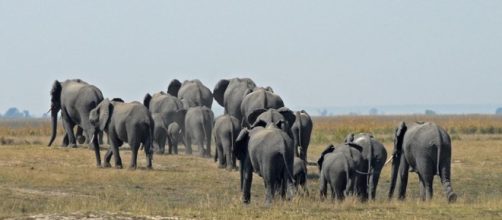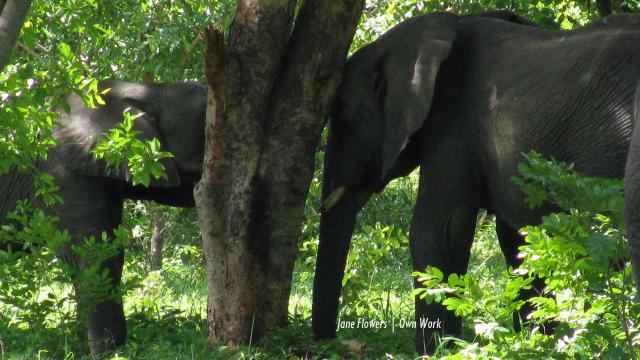Botswana, considered the last refuge of elephants in Africa, disarmed their anti-poaching units in May this year. The country fast became a killing zone and Elephants Without Borders reported 87 elephants found stripped of their tusks near the Okavango Delta wildlife sanctuary. BBC reported that the extent of the slaughter shocked those people carrying out wildlife game counts.
Dr. Mike Chase said that they expected an increase in poaching in the country as two years ago it started to rise near the borders of the country. The concern with 87 recent carcasses is that the killing happened well inside the country.
Chase explained he was "shocked," adding, "I'm completely astounded. The scale of elephant poaching is by far the largest I've seen or read about anywhere in Africa to date."
Nearly 90 elephants found poached after disarming wildlife officials
The dead elephants were found while carrying out the Botswana government's elephant census. According to Chase, most of the deaths were recent. Additionally, they located the bodies of white rhinos. National Public Radio US obtained the "Elephant Poaching Incident Report Reference" which said that these kills were assumed to have been carried out by poachers. Attempts were made to hide the bodies under scrub. Tusks were hacked out of their faces and the carcasses left to rot.
Botswana relies on tourism to support thousands of local people. Until now, the country was thought to be the last safe place for the herds. Across Southern Africa, from countries like Zambia and Zimbabwe, the animals became increasingly under pressure. The relentless slaughter for ivory elsewhere meant Botswana could boast the largest population of the animals. However, within a matter of weeks after then-president Ian Khama retired from politics in April 2018, the incoming president disarmed the anti-poaching units.
Withdrawal of weapons from poaching units not explained
President Mokgweetsi Masisi almost immediately withdrew weapons from the national parks and wildlife services but no explanation was offered.
The country previously had a "shoot to kill" anti-poaching policy in place. Disarming the officials who protect the wildlife resulted in something almost anyone could have predicted - open house slaughter within protected areas.
Botswana, long seen to be the flagship of wildlife protection in Africa made some controversial decisions recently. Commercial hunting bans introduced in 2014 reported on in 2015 by the Guardian were greeted with joy by the anti-hunting lobby. However, it led to the loss of jobs in the sector. Elephants that could still migrate previously used the water holes in hunting areas to trek through to Zimbabwe. With the loss of the water stops, there were fears of a die out.
Additionally, as local communities became disenfranchised from the closure of the hunting sector, they turned to other ways to earn money from wildlife. The easiest profitable cash source comes from poaching.
Controversial hunting ban
At the time of the hunting ban, Democracy Works spokesperson Olmo von Meijenfeldt cautioned that poaching would increase if the income from hunting was taken away. They noted that while Botswana appeared to be at the "cutting edge of conservation," that "one has to be cautionary with the ban on hunting because the effect could be that poaching will increase." The Guardian quoted him as adding that "communities might be forced through economic pressures to supplement the income that was lost through participating in the hunting industry.” Apparently, there seems to be no easy solution to the wildlife problems in Africa, whether through controlled hunting bans, or poaching pressure.
It was noted by the Guardian that Julian Rademeyer, a "South African journalist and author of an exposé of the global trafficking trade entitled "Killing for Profit," said: “I don’t think we’re on top of it. I think it is going to get a lot worse before it gets better.” Sadly, since then that toll of elephants took on a grim increase.
Botswana's glittering elephant protection crown severely tarnished
It seems that Botswana's glittering conservation crown is now severely tarnished. The country became the top destination for those able to afford something millions of others only experience in documentaries. The tourism sector generated £227m in 2014. The decimation of the elephant herds will likely lower that figure substantially.
The country boasted the opportunity to shoot with the camera only. However, who will bother to travel to a country where the elephant slaughter means that soon there won't be any elephants left to photograph? Increasingly, other animals join the tragic demands of wildlife trafficking. Pangolins, giraffes, lion, and cheetah all go to feed the insatiable demand in Asia and elsewhere.
Critical danger to elephant population and tourism sector
In the words of Chase cited by the BBC, "Our new president must uphold Botswana's legacy and tackle this problem quickly. Tourism is vitally important for our economy, jobs, as well as our international reputation, which is at stake here as being a safe stronghold for elephants."


